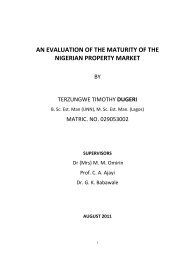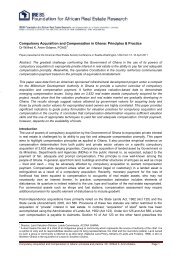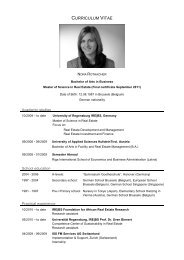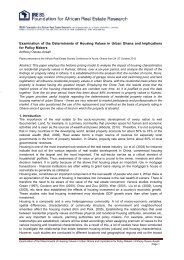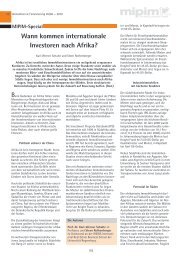You also want an ePaper? Increase the reach of your titles
YUMPU automatically turns print PDFs into web optimized ePapers that Google loves.
Partnership limited by Shares CompanyThis is a company with a capital which consists of one or morejoint portions belonging to one or more joint partners and sharesof equal value subscribed to by one or more ”shareholderpartners”. The partner or joint partners have unlimitedresponsibility for the liability of the company, while theshareholder partner is only responsible to the extent of the valueof the shares it subscribed for. The number of founding partnersmust be at least two and the issued capital must not be less thanthe limit determined by the executive regulations (currentlyLE250 000). Partnerships limited by shares companies are notallowed to undertake insurance business, banking or savingoperations, receive deposits or invest funds on behalf of otherparties. Employees must receive 10% of the company’s profits(distributed through dividends) but this amount must notexceed their total annual income.Limited Liability CompanyThe limited liability company is a company in which the numberof shareholders does not exceed fifty. Each shareholder’s liabilityis limited to his portion. There must be at least twoshareholders. The public subscription and issuance ofnegotiable shares or bonds is prohibited and there arerestrictions on the transfer of the shareholders’ portions. Thecapital of the company may be any amount determined by theshareholders and distributed as equal shares but must be paidcompletely in advance before the foundation of the company.The shares are indivisible and the representation of the sharesby negotiable bonds is not allowed. Every share will have a voteeven if otherwise prescribed by the company’s by-laws.30TaxationA new unified corporate and income tax law was passed on8 June 2005 and became effective 1 July 2005 for personalincome. However, corporate income taxes started from1 January 2006. The new law abolished the general income taxpreviously levied on individuals and imposed an annual tax onthe net personal income of residents and non residents in Egypt.The total sum of net income consists of salaries and theirequivalents, commercial or industrial activities, professional ornon commercial activities and real-estate revenues. Accordingto statistics released by the Ministry of Finance, only 2 millionEgyptians filed their taxes by the end of March 2006. Thiscompares to the 1 million that registered their income for thesame period in 2005. Exemptions previously granted tocompanies and establishments however, continue to apply untilthey expire.Taxes in Egypt may be divided into two categories, namely directtaxation of individual and legal entities on their income or profitand indirect taxation of goods, services and events. The Egyptiantaxation framework is statutory based but many changes havebeen and continue to be made and it is recommended that upto-dateadvice on recent and future changes to the tax law isobtained before establishing a business in Egypt.A real property tax is payable by the owner of real property orthe person who has a real right on real property like usufruct.The rate of this tax varies depending oncertain classifications set out in the statute.Legal SystemThe legal system in Egypt is based on IslamicSharia and a civil law system based on theFrench codified legal system.Intellectual PropertyThe legal regime regarding patents and trademarks is similar tothat of England, and registered owners of intellectual propertyare protected by Egyptian law. Egypt is a signatory to the ParisConvention on the protection of intellectual property and theMadrid Agreement regarding the international registration oftrademarks. Egypt is also a member of the World IntellectualProperty Organization (WIPO).Treaties and Bilateral AgreementsEgypt is a signatory state to the following:General Agreement on Tariffs and Trade (GATT);International Sale of Goods (CISG);Camp David Accords (Egypt Peace Treaty);Joint Defense and Economic Cooperation Treaty betweenthe States of the Arab League;Convention on the Prevention of Double Taxation betweenUSA and Egypt;Convention between the Egyptian government and theKingdom of Saudi Arabia (for the transfer of sentencedpersons).Membership of International and Regional OrganizationsEgypt is a member of the United Nations (UN), <strong>Africa</strong>n Union(AU), International Atomic Energy Agency (IAEA), Conference onDisarmament (CD), Comprehensive Nuclear-Test-Ban TreatyOrganization (CTBTO) and the World Bank.Information and Communications TechnologyEgypt’s Communications and Information technology (CIT)sector is a leading global outsourcing destination ranked sixth onA.T. Kearney’s 2009 Global Services Location Index. This putsEgypt ahead of competitors including the Czech Republic, theUAE, Poland, Canada, Australia and Ireland.In 2008/09, the CIT sector sustained an annual growth rate of14.5%, and received about LE44.4 billion of issued capital flow, agrowth rate of 26% since 2006. Moreover, the sector generatesannual revenues of about LE40.97 billion and contributes about3.8% to real GDP.Leading global players ranging from Intel and Oracle to Orangeand Vodafone have established product development divisionsand call centres serving global operations. Home-grown playersare making their marks nationally, regionally and globally.Egypt’s CIT businesses cover the entire sector. Call centres basedin Egypt serve customers worldwide at all ends of the valuechain. Software developers produce Arabic-language solutionsfor major global software packages and plug-ins for popularEnglish-language programs including Adobe and Microsoft. Aresearch-based technology house created part of the globalWiMAX standard. Niche businesses conduct research and datamining operations, and still others focus on telecom andinfrastructure projects.The total number of direct employees in the CIT sector reached181 734 employees in 2009 (this figure includes IT, Telecom, Postand Smart village employees). A key to the success of this sectoris the close partnership between the government and privatebusinesses.




